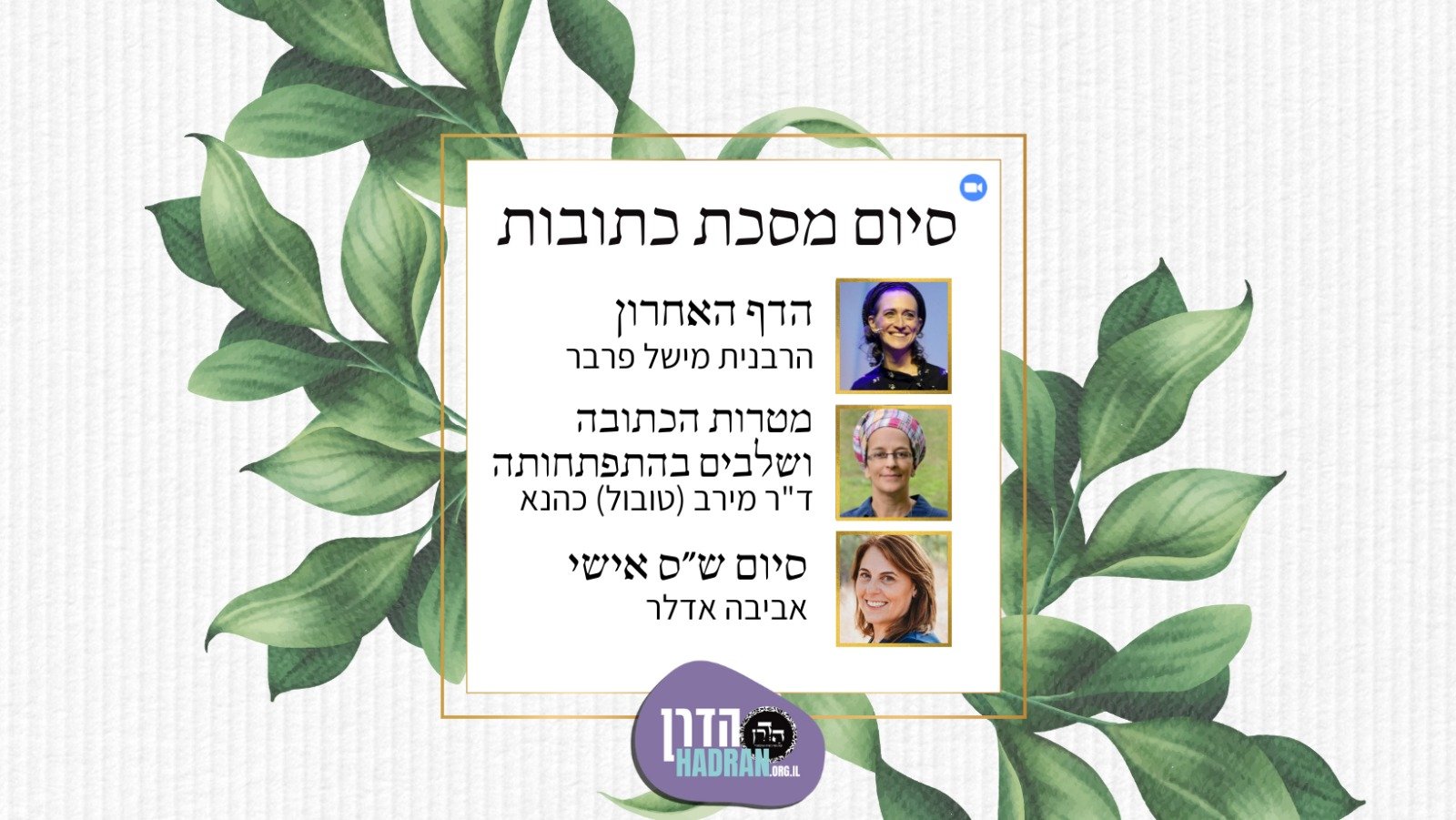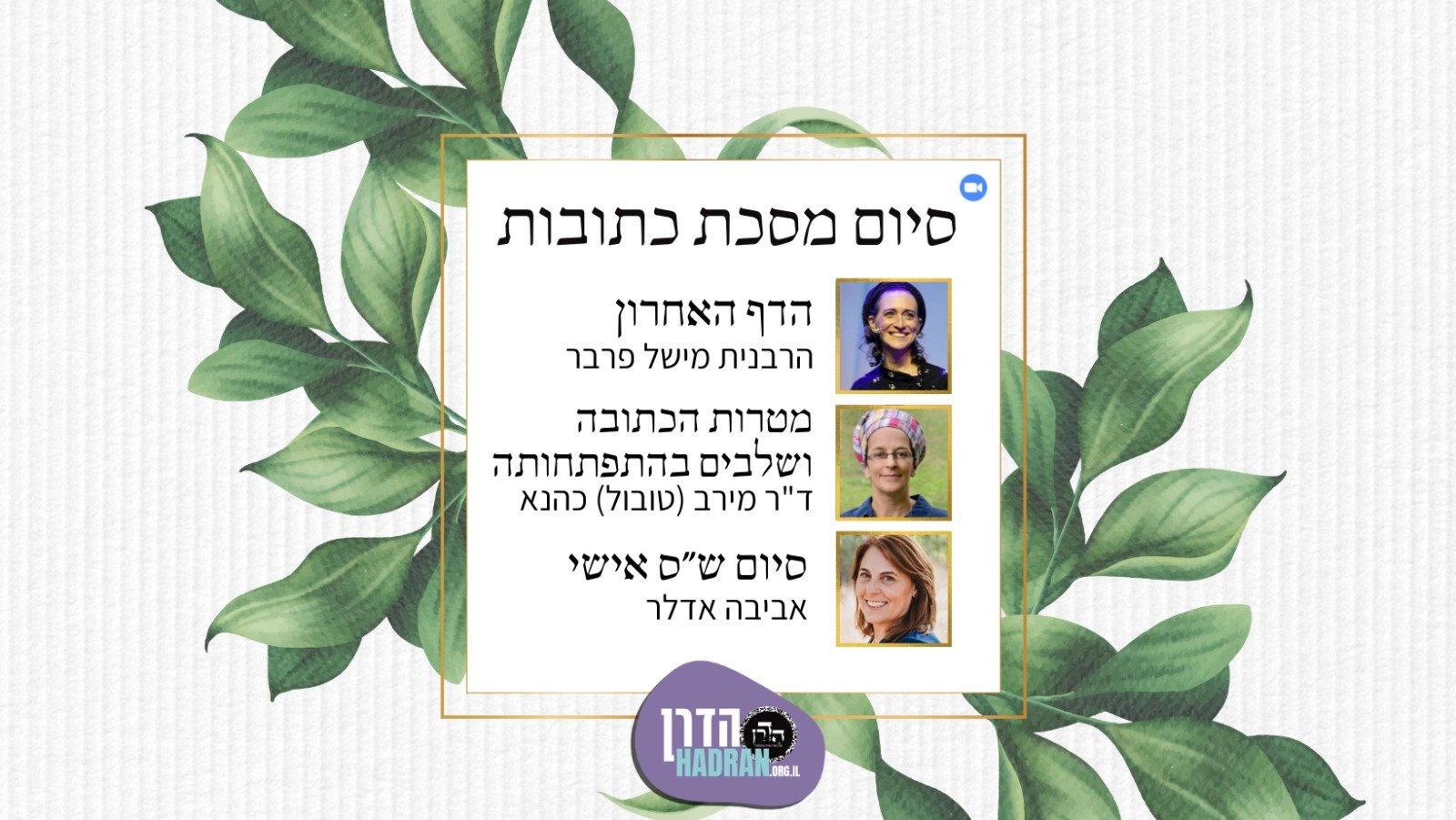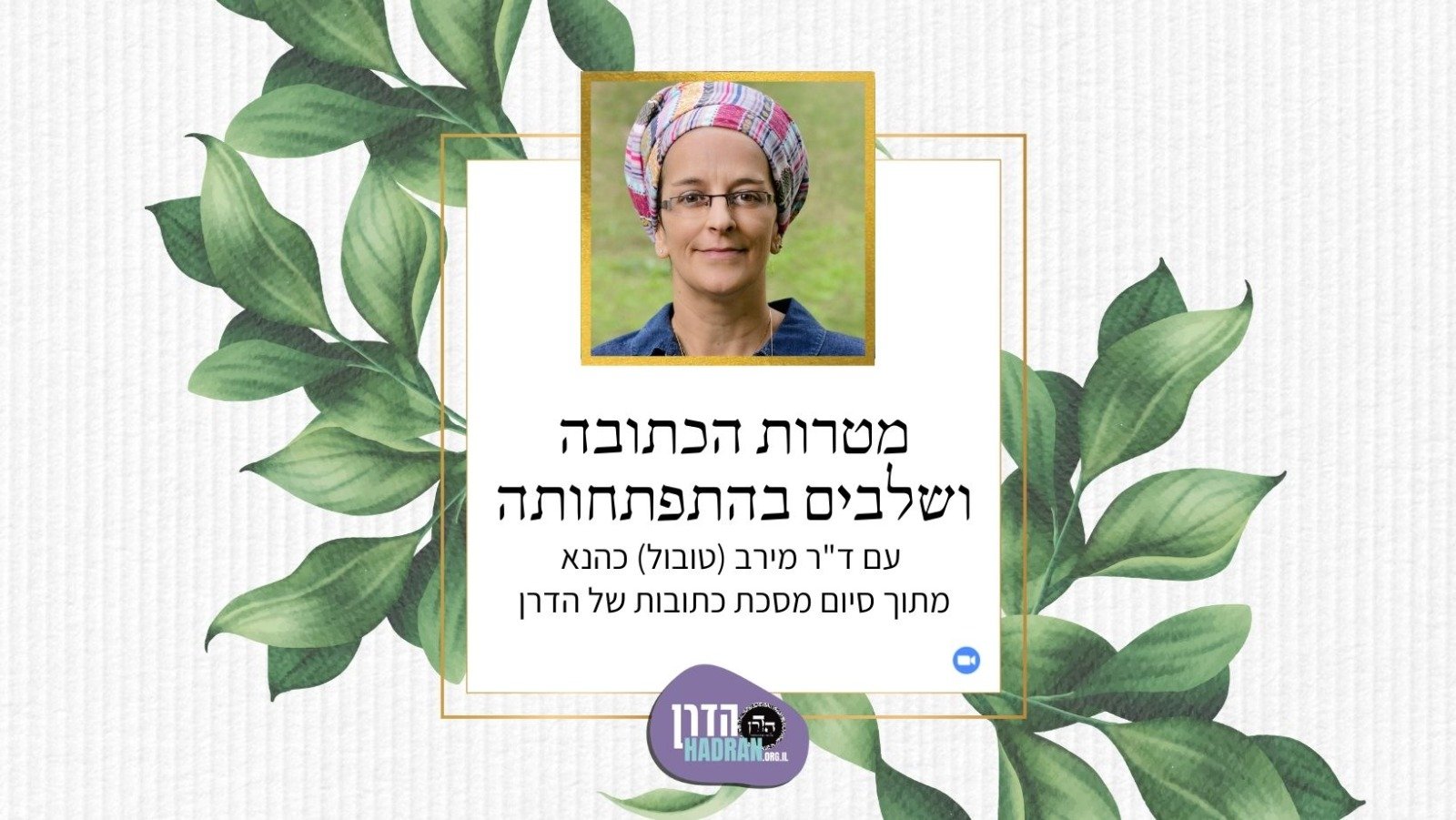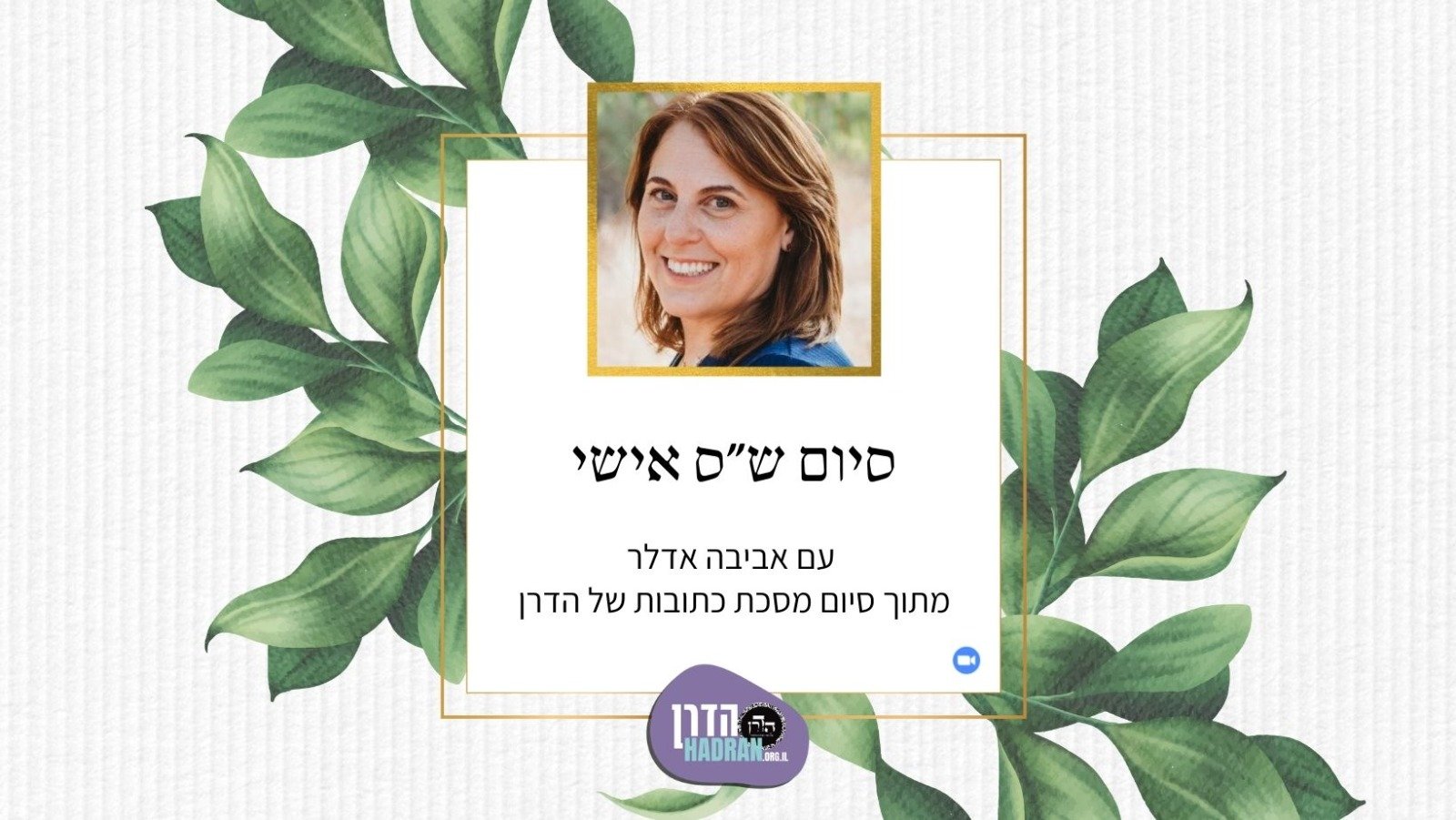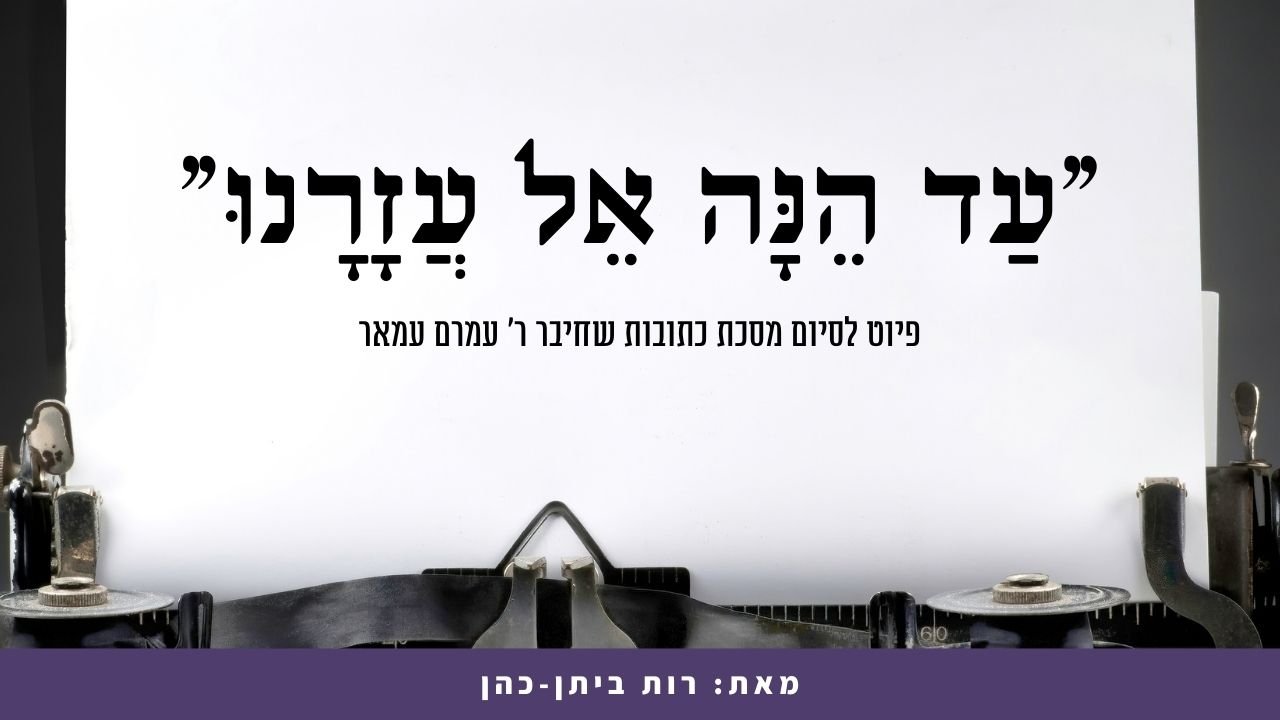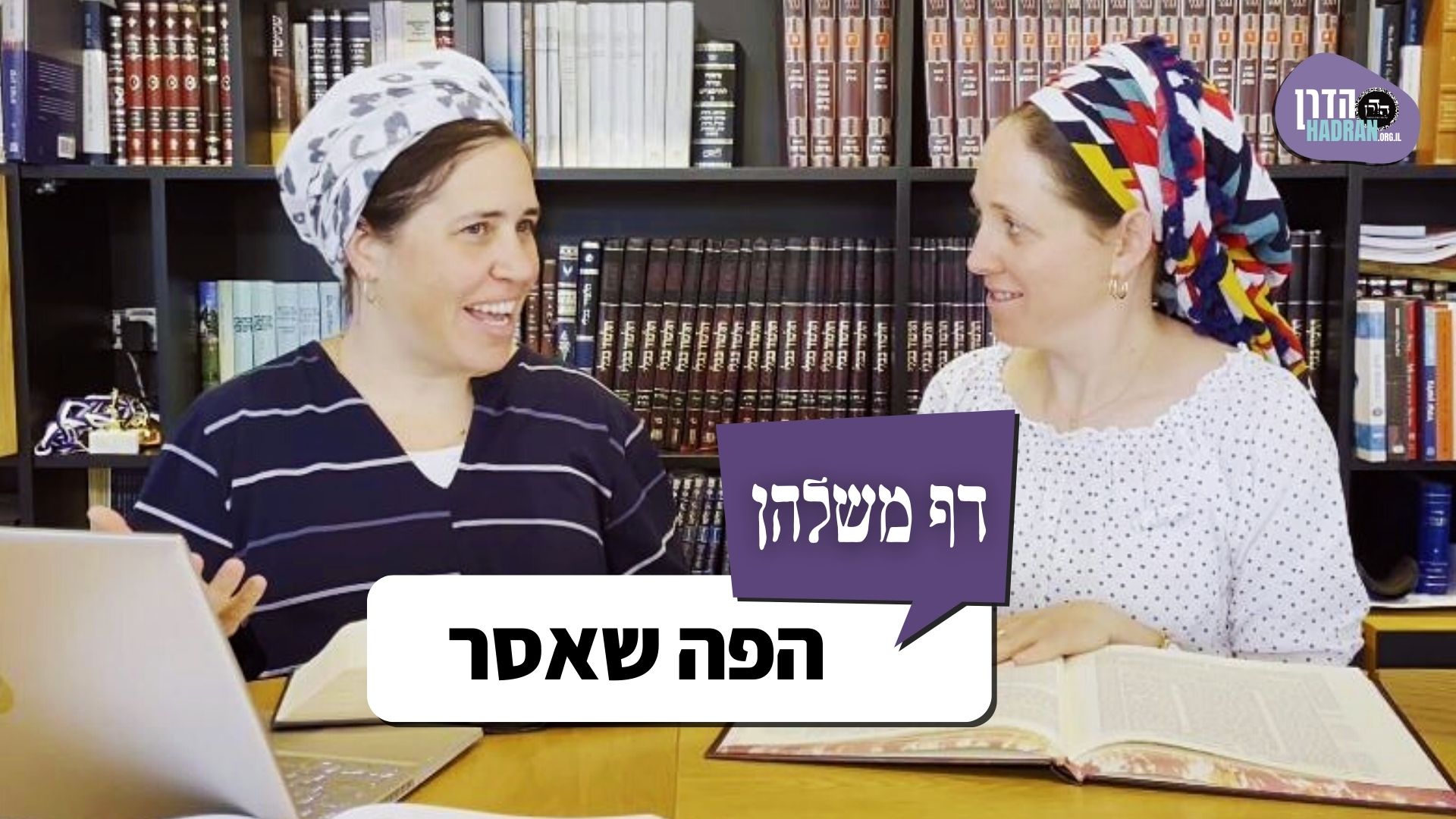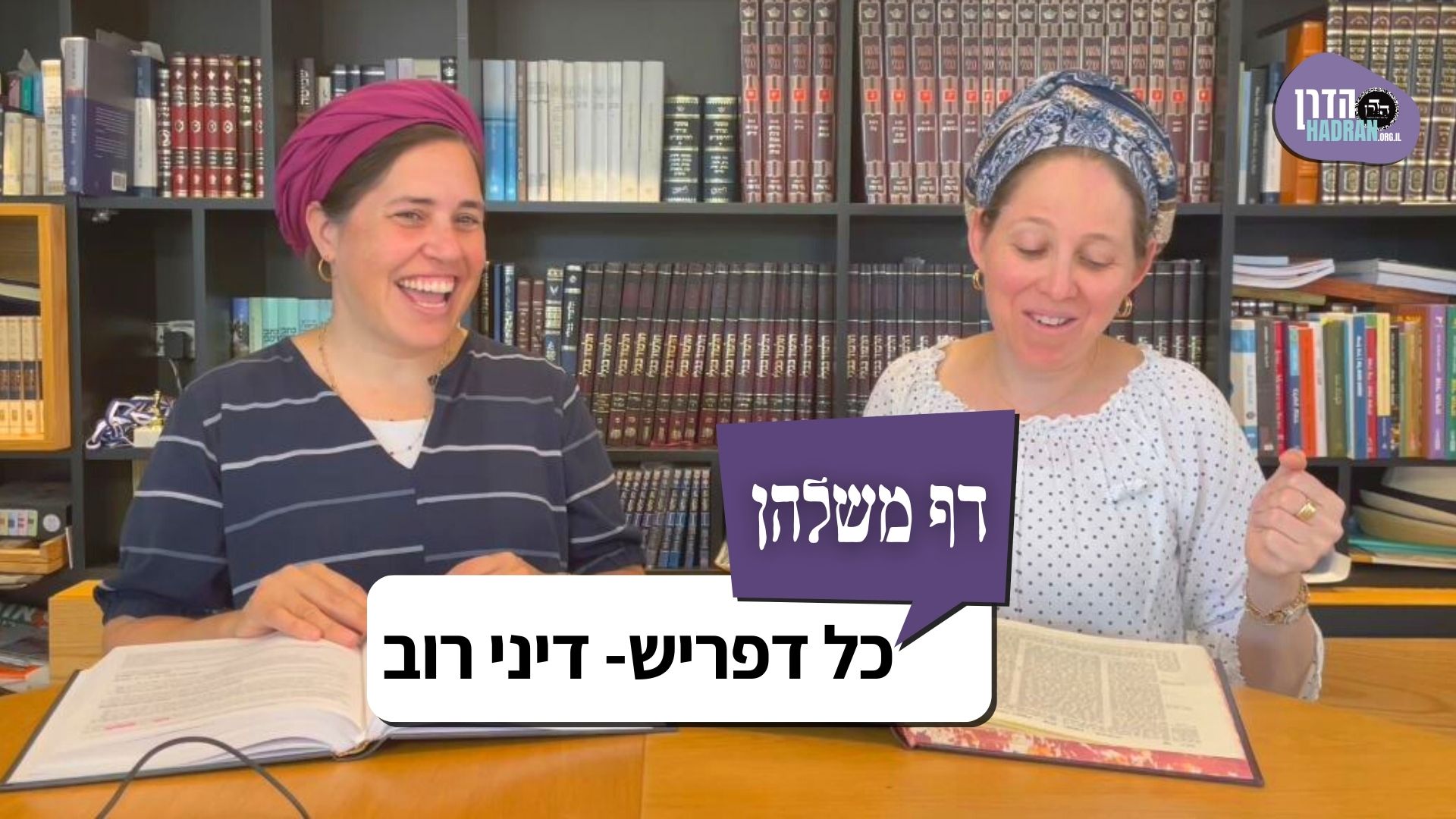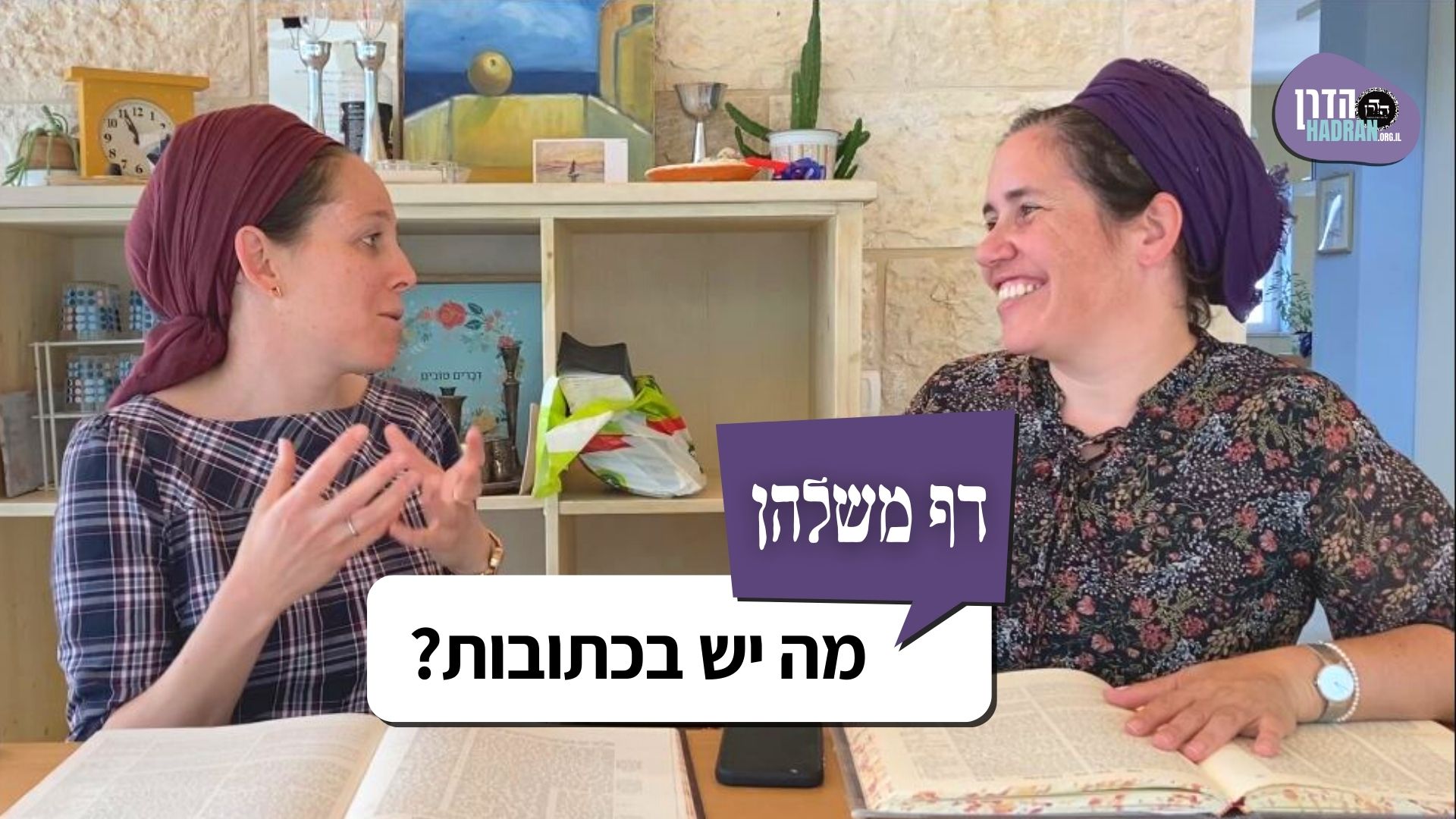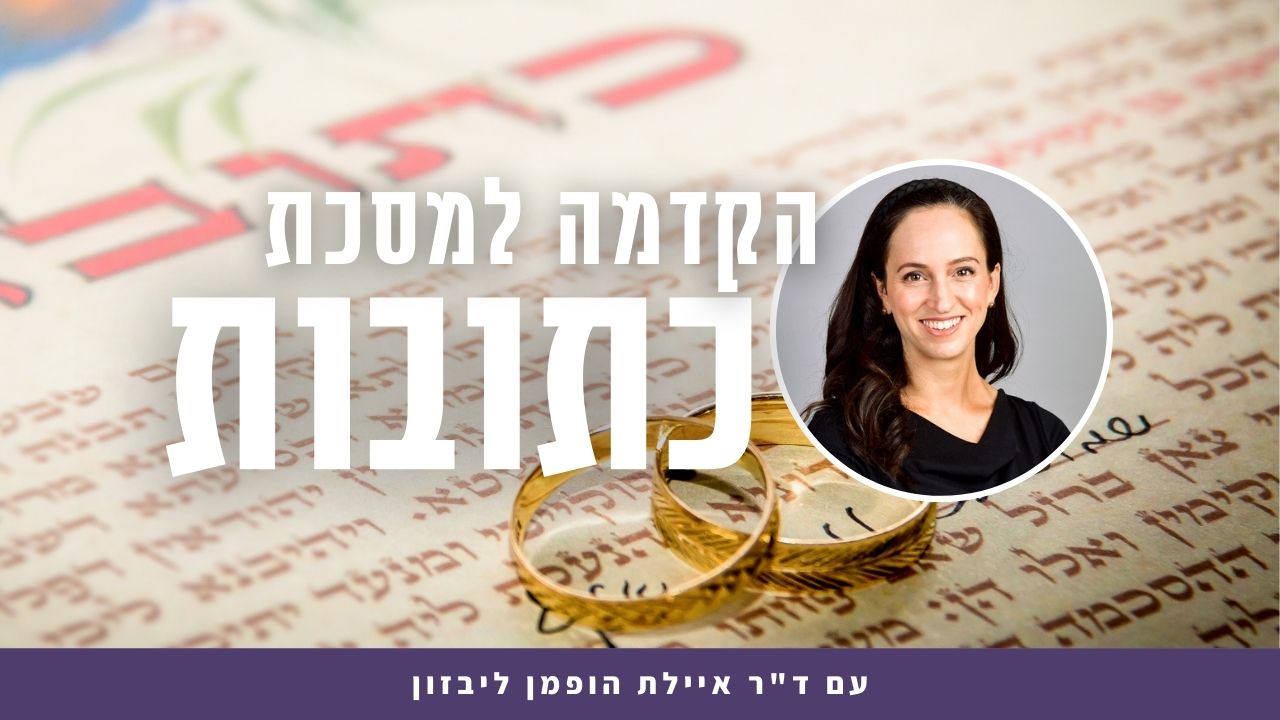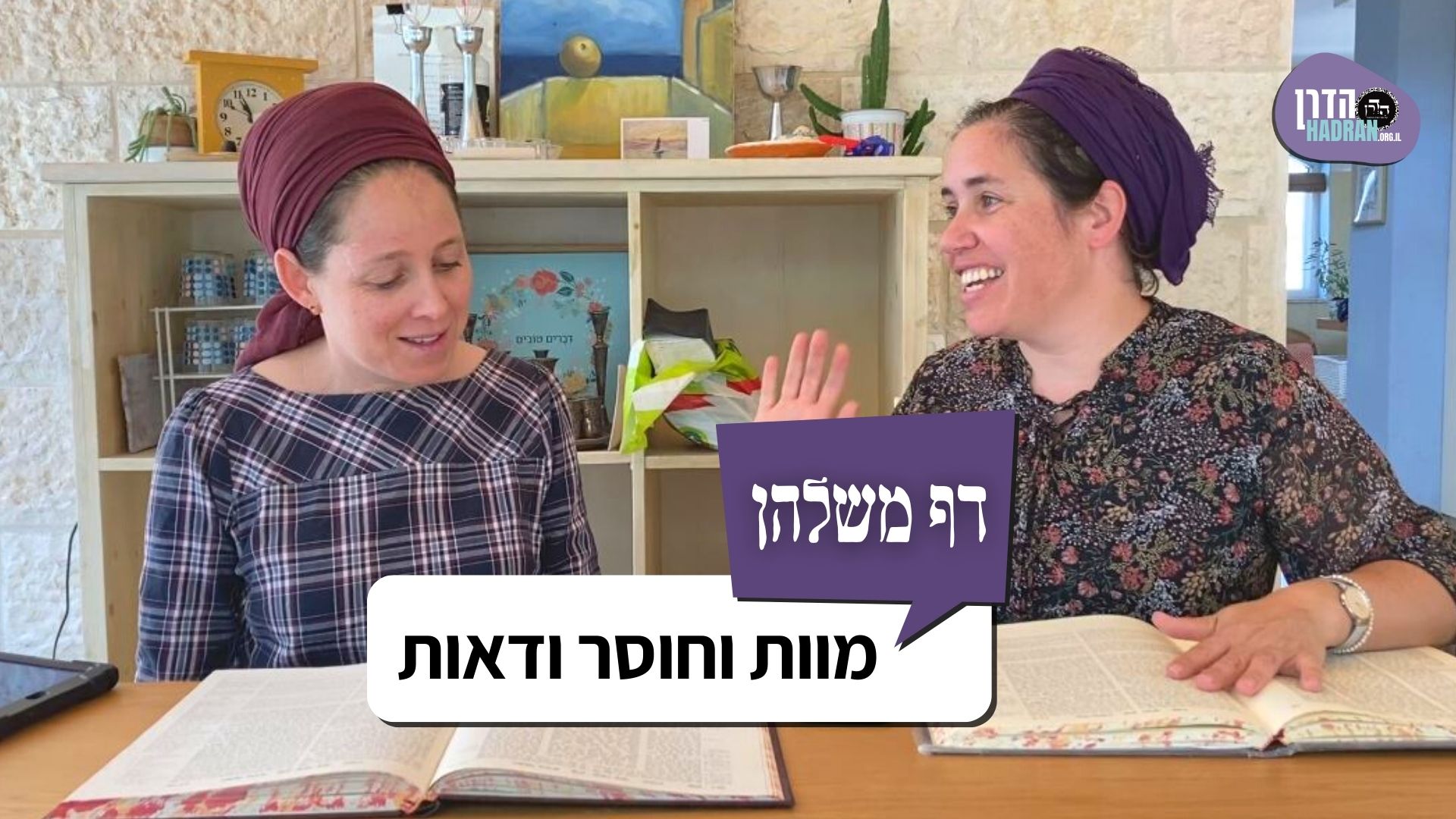כתובות ד
וּבוֹעֵל בְּעִילַת מִצְוָה וּפוֹרֵשׁ, וְנוֹהֵג שִׁבְעַת יְמֵי הַמִּשְׁתֶּה, וְאַחַר כָּךְ נוֹהֵג שִׁבְעַת יְמֵי אֲבֵילוּת. וְכׇל אוֹתָן הַיָּמִים, הוּא יָשֵׁן בֵּין הָאֲנָשִׁים וְהִיא יְשֵׁנָה בֵּין הַנָּשִׁים. וְאֵין מוֹנְעִין תַּכְשִׁיטִין מִן הַכַּלָּה כׇּל שְׁלֹשִׁים יוֹם.
And the groom then engages in intercourse with the bride to fulfill the mitzva, and then he withdraws from his wife, and the corpse is buried. And the groom then observes the seven days of the wedding feast, which are a personal festival for him, when the obligation of mourning rites does not take effect, and thereafter he observes the seven days of mourning. And throughout those days of rejoicing and mourning, the groom sleeps among the men, and the bride sleeps among the women, and they are not permitted to enter into seclusion. And in the event of mourning, one does not withhold jewels from the bride for the entire thirty-day period after the wedding, so that she not be undesirable to her husband.
וְדַוְקָא, אָבִיו שֶׁל חָתָן אוֹ אִמָּהּ שֶׁל כַּלָּה, דְּלֵיכָּא אִינִישׁ דְּטָרַח לְהוּ. אֲבָל אִיפְּכָא — לָא.
And the wedding takes place and is followed by seven days of feasting and seven days of mourning, specifically if it is the father of the groom or the mother of the bride who died, as in that case there is no other person who would exert themselves for them. They are the ones responsible for the wedding preparations, and therefore the preparations that were completed must be utilized. However, if the opposite takes place, i.e., the mother of the groom or the father of the bride dies, no, the practice is different. The corpse is buried immediately, the seven-day mourning period is observed, and only afterward is the couple married.
אָמַר רַפְרָם בַּר פָּפָּא אָמַר רַב חִסְדָּא: לֹא שָׁנוּ אֶלָּא שֶׁנָּתַן מַיִם עַל גַּבֵּי בָּשָׂר, אֲבָל לֹא נָתַן מַיִם עַל גַּבֵּי בָּשָׂר — מִזְדַּבַּן.
Rafram bar Pappa said that Rav Ḥisda said: The Sages taught that they are married immediately only if one already placed water on the meat. In that case, it will be impossible to sell it to others, and if it is not cooked immediately it will spoil and a significant loss will be incurred, potentially resulting in cancellation of the wedding feast. However, if he did not place water on the meat, it can be sold. No significant loss will be incurred, so the mourning period need not be postponed.
אָמַר רָבָא: וּבִכְרַךְ, אַף עַל פִּי שֶׁנָּתַן מַיִם עַל גַּבֵּי בָּשָׂר — מִזְדַּבַּן. אָמַר רַב פָּפָּא: וּבִכְפָר, אַף עַל פִּי שֶׁלֹּא נָתַן מַיִם עַל גַּבֵּי בָּשָׂר — לָא מִזְדַּבַּן. וְאֶלָּא דְּרַב חִסְדָּא הֵיכִי מַשְׁכַּחַתְּ לַהּ? אָמַר רַב אָשֵׁי: כְּגוֹן מָתָא מַחְסֵיָא, דְּמַפְּקָא מִכְּרַךְ, וּמַפְּקָא מִכְּפַר.
Rava said: And in a city, where there are typically many buyers, even if he placed water on the meat it can be sold, and the mourning period need not be postponed. Rav Pappa said: And in a village, even if he did not place water on the meat, it cannot be sold, because no buyers can be found to purchase a quantity of meat that great. Based on the statements of Rava and Rav Pappa, whether or not water was placed on the meat is irrelevant both in a large city and in a village. The Gemara asks: Where do you find a case where the statement of Rav Ḥisda applies? Rav Ashi says: It can be found in a place like his city of Mata Meḥasya, which is removed from the category of a city, as it is too small, and removed from the category of a village, as it is too large.
תַּנְיָא כְּווֹתֵיהּ דְּרַב חִסְדָּא: הֲרֵי שֶׁהָיָה פִּתּוֹ אֲפוּיָה וְטִבְחוֹ טָבוּחַ וְיֵינוֹ מָזוּג, וְנָתַן מַיִם עַל גַּבֵּי בָּשָׂר, וּמֵת אָבִיו שֶׁל חָתָן אוֹ אִמָּהּ שֶׁל כַּלָּה — מַכְנִיסִין אֶת הַמֵּת לַחֶדֶר, וְאֶת הֶחָתָן וְאֶת הַכַּלָּה לַחוּפָּה, וּבוֹעֵל בְּעִילַת מִצְוָה וּפוֹרֵשׁ, וְנוֹהֵג שִׁבְעַת יְמֵי הַמִּשְׁתֶּה, וְאַחַר כָּךְ נוֹהֵג שִׁבְעַת יְמֵי אֲבֵילוּת. וְכׇל אוֹתָן הַיָּמִים, הוּא יָשֵׁן בֵּין הָאֲנָשִׁים וְאִשְׁתּוֹ יְשֵׁנָה בֵּין הַנָּשִׁים.
The following baraita was taught in accordance with the opinion of Rav Ḥisda: If one’s bread was baked, and his animal slaughtered, and his wine diluted, and he placed water on the meat, and the father of the groom or the mother of the bride died, one moves the corpse into a room, and the bride and groom are ushered to the wedding canopy, and they are married. The groom then engages in intercourse with the bride to fulfill the mitzva, and he then withdraws from his wife, and the corpse is buried. And the groom then observes the seven days of the wedding feast, and thereafter observes the seven days of mourning. And throughout those days of feast and mourning, the groom sleeps among the men, and his wife sleeps among the women, and they are not permitted to be alone together.
וְכֵן מִי שֶׁפֵּירְסָה אִשְׁתּוֹ נִדָּה — הוּא יָשֵׁן בֵּין הָאֲנָשִׁים וְהִיא יְשֵׁנָה בֵּין הַנָּשִׁים. וְאֵין מוֹנְעִין תַּכְשִׁיטִין מִן הַכַּלָּה כָּל שְׁלֹשִׁים יוֹם. בֵּין כָּךְ וּבֵין כָּךְ לֹא יִבְעוֹל, לֹא בְּעֶרֶב שַׁבָּת וְלֹא בְּמוֹצָאֵי שַׁבָּת.
And likewise, a groom whose wife began to menstruate at the time of the wedding, he sleeps among the men and she sleeps among the women, until she becomes ritually pure. However, the Sages do not withhold jewels from the bride while she is in mourning for the entire thirty-day period after the wedding. In any event, the groom may not engage in intercourse with his virgin bride, neither on Shabbat evening, as he will thereby inflict a wound, nor at the conclusion of Shabbat.
אָמַר מָר: הוּא יָשֵׁן בֵּין הָאֲנָשִׁים וְהִיא יְשֵׁנָה בֵּין הַנָּשִׁים, מְסַיַּיע לֵיהּ לְרַבִּי יוֹחָנָן. דְּאָמַר רַבִּי יוֹחָנָן: אַף עַל פִּי שֶׁאָמְרוּ אֵין אֲבֵילוּת בַּמּוֹעֵד, אֲבָל דְּבָרִים שֶׁל צִינְעָא — נוֹהֵג.
The Gemara proceeds to analyze the baraita. The Master said: He sleeps among the men and she sleeps among the women. This supports the opinion of Rabbi Yoḥanan, as Rabbi Yoḥanan said: Although they stated that there is no mourning observed on a Festival, yet one observes matters of privacy, i.e., mourning practices not apparent to onlookers. Therefore, the groom and the bride may not engage in relations during the seven days of rejoicing, as the legal status of those days is like that of a Festival for them.
דָּרֵשׁ רַב יוֹסֵף בְּרֵיהּ דְּרָבָא מִשְּׁמֵיהּ דְּרָבָא: לֹא שָׁנוּ אֶלָּא שֶׁלֹּא בָּעַל, אֲבָל בָּעַל — אִשְׁתּוֹ יְשֵׁנָה עִמּוֹ.
Rav Yosef, son of Rava, taught in the name of Rava: They taught the halakha that if the bride began menstruating, the bride and groom may not be alone together, only if he did not engage in intercourse with her. However, if he engaged in intercourse with her, and afterward she begins menstruating, his wife sleeps with him, and there is no concern that this will lead to their engaging in forbidden relations.
וְהָא הָכָא, דִּבְבָעַל עָסְקִינַן, וְקָתָנֵי: הוּא יָשֵׁן בֵּין הָאֲנָשִׁים וְהִיא יְשֵׁנָה בֵּין הַנָּשִׁים! כִּי קָאָמַר, אַפֵּירְסָה אִשְׁתּוֹ נִדָּה.
The Gemara asks: But here, with regard to mourning, we are dealing with a case where he already engaged in intercourse that was permitted prior to the funeral, and yet the tanna teaches: He sleeps among the men and she sleeps among the women. The Gemara answers: When he states the ruling that if they already engaged in intercourse she sleeps with him, it was concerning only a case where his wife began menstruating, and it is not a case of mourning.
הָא ״וְכֵן״ קָתָנֵי!
The Gemara asks: But doesn’t it state: And likewise, indicating that the legal status of the mourner and the legal status of the groom whose wife is menstruating are the same?
הָכִי קָאָמַר: וְכֵן מִי שֶׁפֵּירְסָה אִשְׁתּוֹ נִדָּה וְלֹא בָּעַל — הוּא יָשֵׁן בֵּין הָאֲנָשִׁים, וְאִשְׁתּוֹ יְשֵׁנָה בֵּין הַנָּשִׁים.
This is what the tanna is saying: And likewise, with regard to a groom whose wife began to menstruate, and he had not yet engaged in intercourse with her, he sleeps among the men, and his wife sleeps among the women. However, in the case of a mourner, even if they already engaged in sexual relations, he sleeps among the men and she sleeps among the women.
לְמֵימְרָא דַּאֲבֵילוּת קָיְלָא לֵיהּ מִנִּדָּה?
The Gemara asks: Is that to say that the prohibition against relations during mourning is more lenient in his opinion than the prohibition against relations with a menstruating woman? That is apparently the case, as after engaging in the initial intercourse, he may enter into seclusion with his menstruating wife but not with his wife when either of them is in mourning.
וְהָאָמַר רַבִּי יִצְחָק בַּר חֲנִינָא אָמַר רַב הוּנָא: כׇּל מְלָאכוֹת שֶׁאִשָּׁה עוֹשָׂה לְבַעְלָהּ — נִדָּה עוֹשָׂה לְבַעְלָהּ, חוּץ מִמְּזִיגַת הַכּוֹס וְהַצָּעַת הַמִּטָּה, וְהַרְחָצַת פָּנָיו יָדָיו וְרַגְלָיו. וְאִלּוּ גַּבֵּי אֲבֵילוּת תַּנְיָא: אַף עַל פִּי שֶׁאָמְרוּ אֵין אָדָם רַשַּׁאי לָכוֹף אֶת אִשְׁתּוֹ לִהְיוֹת כּוֹחֶלֶת וְלִהְיוֹת פּוֹקֶסֶת, בֶּאֱמֶת אָמְרוּ: מוֹזֶגֶת לוֹ הַכּוֹס, וּמַצַּעַת לוֹ הַמִּטָּה, וּמַרְחֶצֶת לוֹ פָּנָיו יָדָיו וְרַגְלָיו.
The Gemara continues: But didn’t Rav Yitzḥak bar Ḥanina say that Rav Huna said: All tasks that a woman typically performs for her husband, a menstruating woman performs for her husband, except for pouring his drink into the cup; arranging his bed; and washing his face, hands, and feet, as these actions are particularly intimate. Whereas with regard to mourning, it is taught in a baraita: Although they said that a man may not compel his mourning wife, to paint her eyes blue or to rouge [pokeset] her face, in truth they said that she may pour his drink into the cup; arrange his bed; and wash his face, hands, and feet. Apparently, the concern lest they come to engage in relations while in mourning is less pressing than the concern while she is menstruating.
לָא קַשְׁיָא: כָּאן — בַּאֲבֵילוּת דִּידֵיהּ, כָּאן — בַּאֲבֵילוּת דִּידַהּ.
The Gemara answers: This is not difficult. Here, where the Sages required them to sleep apart, it is in a case of the husband’s mourning; there, where the Sages allowed her to pour his drink and perform other intimate activities, it is in a case of the wife’s mourning. The prohibition against relations when one is mourning is not perceived to be as severe as the prohibition against relations with a menstruating woman. However, when his wife is mourning, even were he unable to restrain himself, his wife would not be complicit. Therefore, the Sages did not restrict their interaction.
וְהָא אָבִיו שֶׁל חָתָן אוֹ אִמָּהּ שֶׁל כַּלָּה קָתָנֵי! כִּי קָתָנֵי, אַשְּׁאָרָא.
The Gemara asks: But isn’t it taught in that baraita: The father of the groom and the mother of the bride? This indicates that it makes no difference which of them was in mourning. When the tanna teaches that there is no distinction between which of them was in mourning, it was concerning the rest of the mourning practices cited there, not with regard to prohibiting their seclusion.
וּמִי שָׁאנֵי בֵּין אֲבֵילוּת דִּידֵיהּ לַאֲבֵילוּת דִּידַהּ? וְהָתַנְיָא: מִי שֶׁמֵּת חָמִיו אוֹ חֲמוֹתוֹ — אֵינוֹ יָכוֹל לָכוֹף אֶת אִשְׁתּוֹ לִהְיוֹת כּוֹחֶלֶת וְלִהְיוֹת פּוֹקֶסֶת, אֶלָּא כּוֹפֶה מִטָּתוֹ, וְנוֹהֵג עִמָּהּ אֲבֵילוּת. וְכֵן הִיא שֶׁמֵּת חָמִיהָ אוֹ חֲמוֹתָהּ — אֵינָהּ רַשָּׁאָה לִהְיוֹת כּוֹחֶלֶת וְלִהְיוֹת פּוֹקֶסֶת, אֶלָּא כּוֹפָה מִטָּתָהּ וְנוֹהֶגֶת עִמּוֹ אֲבֵילוּת.
The Gemara asks: And do the Sages distinguish between his mourning and her mourning? But isn’t it taught in a baraita: With regard to one whose father-in-law or mother-in-law died, he may not compel his wife to paint her eyes blue or to rouge her face. Rather, he overturns his bed, as was the practice among mourners, and observes the mourning period with her. And likewise, if a wife’s father-in-law or mother-in-law dies, she is not allowed to paint her eyes blue or to rouge her face. Rather, she overturns her bed and observes the mourning period with him. There is no mention in the context of his mourning that he must not be alone with his wife.
תְּנִי בַּאֲבֵילוּת דִּידֵיהּ: הוּא יָשֵׁן בֵּין הָאֲנָשִׁים וְאִשְׁתּוֹ יְשֵׁנָה בֵּין הַנָּשִׁים. הָא ״וְכֵן״ קָתָנֵי! כִּי קָתָנֵי, אַכִּיחוּל וְאַפִּירְכּוּס. וְהָא ״עִמּוֹ״ קָתָנֵי, מַאי לָאו עִמּוֹ בַּמִּטָּה! לֹא, עִמּוֹ בַּבַּיִת. וּכְדַאֲמַר לֵיהּ רַב לְחִיָּיא בְּרֵיהּ: בְּאַפַּהּ נְהוֹג אֲבִילוּתָא, דְּלָא בְּאַפַּהּ לָא תִּנְהוֹג אֲבִילוּתָא.
The Gemara emends the baraita. Teach with regard to his mourning: He sleeps among the men and his wife sleeps among the women. The Gemara asks: But doesn’t the tanna teach: And likewise? This indicates that there is no difference between the two cases. The Gemara answers: When the tanna teaches that there is no distinction between which of them is mourning, it is with regard to painting and rouge. The Gemara asks: But doesn’t the tanna teach: With him? What, does it not mean with him together in bed, and there is no concern that it will lead to sexual relations? No, it means with him at home, and it is as that which Rav said to Ḥiyya, his son, when his wife’s father died: Before her, observe mourning practices; not before her, do not observe mourning practices. Understood in this context, the term: With him, means in his presence.
רַב אָשֵׁי אָמַר: מִי קָמְדַמֵּית אֲבִילוּתָא דְהָכָא לַאֲבִילוּתָא דְעָלְמָא? אֲבִילוּתָא דְעָלְמָא חֲמִיר, וְלָא אָתֵי לְזַלְזוֹלֵי בֵּיהּ. אֲבֵילוּת דְהָכָא, כֵּיוָן דְּאַקִּילוּ רַבָּנַן, אָתֵי לְזַלְזוֹלֵי בֵּיהּ.
Rav Ashi said that the question was based on a mistaken premise: Can you compare the mourning here with mourning in general? Mourning in general is stringent, and one will not come to take it lightly. However, with regard to mourning here, immediately following the wedding, since the Sages were lenient, one will come to take it lightly.
מַאי קוּלָּא? אִילֵּימָא דְּקָתָנֵי בּוֹעֵל בְּעִילַת מִצְוָה וּפוֹרֵשׁ — הָתָם מִשּׁוּם דְּלֹא חָל עָלָיו אֲבִילוּתָא, אִי לְרַבִּי אֱלִיעֶזֶר עַד שֶׁיֵּצֵא מִפֶּתַח הַבַּיִת, אִי לְרַבִּי יְהוֹשֻׁעַ עַד שֶׁיִּסָּתֵם הַגּוֹלֵל.
What leniency did the Sages enact in this case? If we say it is that which the tanna teaches: The groom engages in the initial intercourse with the bride to fulfill the mitzva and then he withdraws from his wife, then there, where the corpse is placed into a room in the house, it is due to the fact that mourning has not yet taken effect upon him. Consequently, there is no leniency with regard to mourning practices. If it is according to the opinion of Rabbi Eliezer, mourning does not take effect until the corpse emerges from the entrance of the house for burial. If it is according to the opinion of Rabbi Yehoshua, mourning does not take effect until the covering of the grave is sealed.
אֶלָּא דְּקָתָנֵי: נוֹהֵג שִׁבְעַת יְמֵי הַמִּשְׁתֶּה, וְאַחַר כָּךְ נוֹהֵג שִׁבְעַת יְמֵי אֲבֵילוּת.
Rather, the leniency is that which the tanna teaches: And the groom then observes the seven days of feast following the wedding, and thereafter he observes the seven days of mourning. Since the Sages were lenient and allowed him to observe the wedding feast, despite the fact that he is a mourner, they prohibited his being alone with his wife so he would be less likely to practice additional leniencies in his mourning.
אָמַר מָר: בֵּין כָּךְ וּבֵין כָּךְ לֹא יִבְעוֹל, לֹא בָּעֶרֶב שַׁבָּת וְלֹא בְּמוֹצָאֵי שַׁבָּת. בִּשְׁלָמָא בְּעֶרֶב שַׁבָּת — מִשּׁוּם חַבּוּרָה. אֶלָּא בְּמוֹצָאֵי שַׁבָּת, אַמַּאי לָא?
§ The Master said in the baraita: In any event, the groom may not engage in intercourse with his virgin bride, neither on Shabbat evening, nor at the conclusion of Shabbat. Granted, on Shabbat evening he may not engage in intercourse due to the prohibition against inflicting a wound on Shabbat. However, at the conclusion of Shabbat, why may he not engage in intercourse with his virgin bride?
אָמַר רַבִּי זֵירָא:
Rabbi Zeira said:

